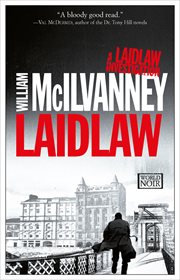Review by Publisher's Weekly Review
At the start of Edgar-finalist McIlvanney's excellent second entry-first published in 1983-in his Laidlaw trilogy, Det. Insp. Jack Laidlaw receives a summons to a Glasgow hospital from a homeless man he knows, Alexander "Eck" Adamson. The alcoholic Eck is largely incoherent, but before he expires, Laidlaw is able to make out one repeated statement: "The wine he gave me wisny wine." Among Eck's few possessions is a piece of paper with a handwritten note that appears to be some sort of philosophical manifesto. Two names also appear on the paper. Laidlaw and his partner, Det. Constable Brian Harkness, discover that one of those named, a well-known thug, has recently been murdered. When they examine Eck's possessions more thoroughly, Laidlaw and Harkness wonder who helped Eck write his mini manifesto, and this leads them to well-to-do Tony Veitch. New evidence soon proves that Eck didn't drink himself to death; he was poisoned. Veitch becomes the prime suspect for both murders, despite Laidlaw's doubts that he's actually the killer. But forces beyond Laidlaw's control, on both sides of the law, try to thwart his investigation at every turn. McIlvanney, the undisputed grandfather of tartan noir, gives reader a complex, existential hero struggling to right myriad wrongs. Agent: Laura Mamelok, Susanna Lea Associates. (Sept.) © Copyright PWxyz, LLC. All rights reserved.
Review by Kirkus Book Review
It's been a long time since Laidlaw (1977), McIlvanney's memorable Glasgow-cop debut, with high expectations for a sequel. But, though much of the original grit and dialect and vivid portraiture is on display here, this is a largely disappointing follow-up--without the focus or taut pace of its predecessor. This time loner Jack Laidlaw starts out by investigating the death of a poisoned old tramp, whose deathbed clues are two names: Paddy Collins; Lynsey Farren. And Laidlaw soon identifies Collins as a recently killed underworld type, Fatten as a slumming rich girl who's been moving from lover to lover among Glasgow's top low-lifes, with sporadic returns to yet another lover: Tony Veitch, a Glasgow student with a rich father, radical leanings, dangerous pals. . . and unknown recent whereabouts. Laidlaw finds him dead, too, of course, and eventually nabs his killer (a particularly undramatic revelation). But while Laidlaw's sleuthings among high and low are generally absorbing, with a few riveting vignettes, much of the novel follows related subplots among the Glasgow mobsters: a revenge scheme by Paddy Collins' brother-in-law; the rovings of a thug who was planning to join the late Paddy in a blackmail plot against Veitch. And, especially since the Glaswegian argot is occasionally impenetrable, these non-Laidlaw sequences make things often slow, sometimes murky. Not on the Laidlaw level, then, though still rich in grim city backgrounds and roughly eloquent atmosphere. Copyright ©Kirkus Reviews, used with permission.
Copyright (c) Kirkus Reviews, used with permission.

